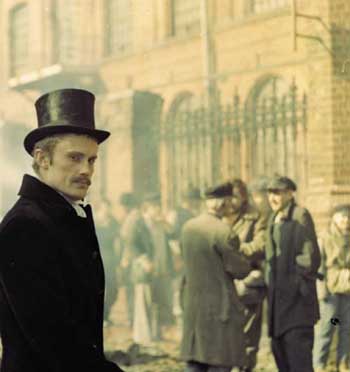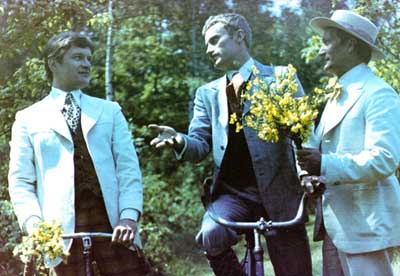
Wajda and the making and revising of The Promised Land, the film
 Daniel Olbrychski as Karol Borowiecki |
The film run three hours (180 minutes) but Wajda had enough material for four hours, and so three years later, on May 21, 1978, a television version of The Promised Land was shown on Polish Television.
 Andrzej Seweryn as Marks Baum, Daniel Olbrychski as Karol Borowiecki, and Wojciech Pszoniak as Moryc Welt |
On October 9, 2000 Warsaw's most prestigious theater, its Teatr Wielki, featured a new version of the film, 30 minutes shorter than the original. In the new version, Wajda had changed the sequence of some of the film's scenes. In discussing the new version, Wajda said that he introduced three changes. the most important was moving the opening scene on the Borowiecki estate in Kurów to the second part of the film. At the time that he shot the film, he had felt that he had to introduce the viewer to the world from which his protagonist came; the idyllic world of the gentlefolk complete with the estate on which lives the noble past - Karol Borowiecki's father. It was only later in the film that he presented to the viewers the fact that it was from this world that spawned Karol, a man of action and strong character, a true Lodzmensch. Now, a quarter of a century later, he sees the real beginning of the film is the prayer, of the German, the Jews and the Pole. Its important that this beginning takes place in £ód¼, since this is a film about that place. Borowicki is introduced to the viewer as a man without scruples, frequently acting in a brutal manner. Only later will the viewer see what are his real roots is introduced. The contrast between this "beast" and the gentleness of his childhood is startling. The second change is the shortening of the film. When originally made, each scene represented a major effort on the part of the actors and the filming crew, hence it seemed inappropriate to excise it from the final product. Looking at it with fresh eyes after the passage of 25 years Wajda decided that some scenes were not essential. The third change Wajda introduced was to add a scene from the TV version of the film. He states that while he was writing the script he had been very moved that Reymont, describing £ód¼ as the locus of pitiless exploitation, of seeking of wealth, which he portrayed ironically as in a bent mirror, place their a scene as if from another world. In that scene several factory clerks and employees of exchange houses gather in a cellar where they jointly make music, playing classical pieces. It appear that these people, seemingly so engrossed in financial affairs, have some spiritual needs, dumped down by the daily struggle to amass wealth in this accelerated rhythm of life. That scene casts a new light not only on these individuals but also on £ód¼, which later in the 1918-39 inter-war period became an artistic town.
The above is an edited translation by Peter K. Gessner of Film Polski pieces about the various version of the film
| info-poland | Poland in the Classroom | Reymont pages |
| Info-Poland a clearinghouse of information about Poland, Polish Universities, Polish Studies, etc. |